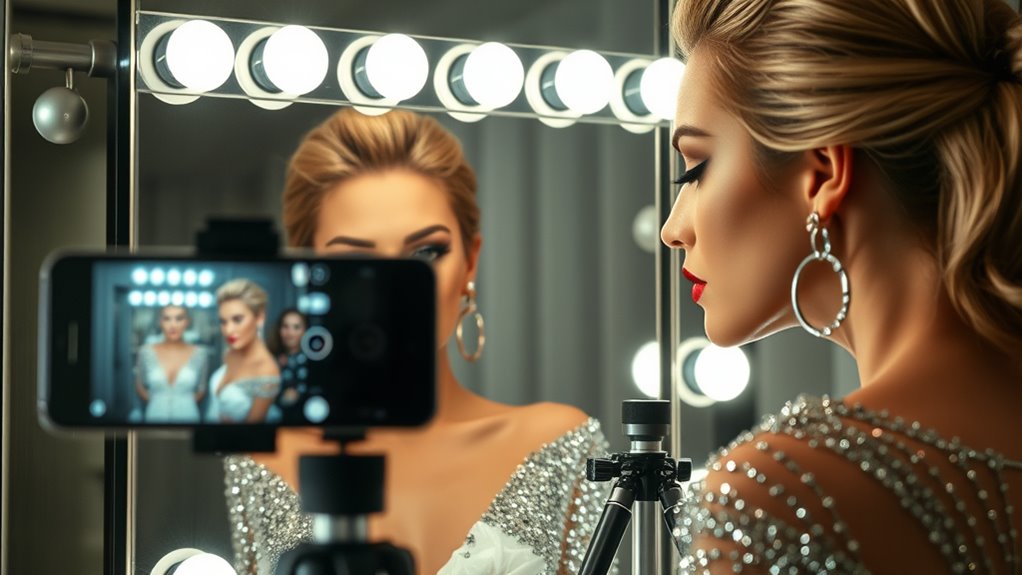Celebrity narcissists often reflect how fame, industry pressures, and social media amplify traits like self-importance and entitlement. Many show these patterns even before reaching stardom, rooted in psychological and neural factors such as brain structures that impact social cognition and empathy. Their behavior is reinforced through constant validation and parasocial relationships. To understand how fame shapes these traits—and the lessons they offer—you’ll uncover more about the roots and consequences of celebrity narcissism.
Key Takeaways
- Many celebrities exhibit narcissistic traits prior to fame, highlighting self-selection into industries that reward self-promotion.
- Fame activates brain regions associated with self-focus, which can exacerbate narcissistic behaviors and impair empathy.
- Social media reinforces celebrity narcissism through validation loops, boosting grandiosity and attention-seeking tendencies.
- Gender and cultural norms influence how narcissism manifests and is perceived among public figures globally.
- Recognizing neural and behavioral patterns in celebrities offers lessons for understanding and managing narcissistic traits.
Understanding the Narcissistic Traits of Celebrities

Understanding the narcissistic traits of celebrities helps explain their often self-centered behavior and public image. Narcissism involves traits like grandiosity, a need for admiration, and a lack of empathy. As a celebrity, you’re constantly in the spotlight, which can amplify these tendencies. Famous figures like Donald Trump and Madonna showcase narcissistic behaviors through their self-importance and grand claims. Media exposure, especially via reality TV shows like “The Hills,” can also heighten these traits, as seen in Spencer and Heidi Pratt. The public often perceives celebrities as narcissistic because of their self-promotional acts, which can sometimes be exaggerated. These traits also strain personal relationships, impacting well-being and how they’re viewed by fans and critics alike. Additionally, the public image of celebrities is often carefully curated to enhance their narcissistic traits, further fueling perceptions of self-importance. Moreover, understanding AI vulnerabilities in safety measures can help in managing the risks associated with celebrity influence and digital reputation. Recognizing the role of color accuracy and other technological factors can shed light on how celebrities craft their visual personas to project perfection. Furthermore, the influence of seasonal variations in their public appearances can sometimes be used to manipulate public perception and reinforce their image.
The Psychological Roots of Celebrity Narcissism

The roots of celebrity narcissism lie deep within neurobiological and psychological processes that shape personality and behavior. Specific brain regions involved in social cognition and empathy, like the medial prefrontal cortex (mPFC), influence narcissistic traits when they function differently. The dopamine reward system plays a key role; heightened activity here makes praise and attention feel rewarding, reinforcing narcissistic behaviors. Variations in brain structures can impair empathy and understanding of others’ emotions, fueling entitlement and grandiosity. Additionally, research indicates that brain structure variations can significantly impact empathetic capacity, which is often diminished in narcissistic individuals. Studies have also shown that neuroplasticity suggests these brain differences can potentially be modified through behavioral interventions. Moreover, understanding these biological mechanisms underscores the importance of early detection and intervention for narcissistic tendencies. For example, targeted therapies that focus on enhancing empathy and social cognition may help mitigate some narcissistic traits. These insights into neurobiological factors highlight the complex interplay between biology and environment in shaping narcissistic behavior. Psychologically, many celebrities exhibit traits linked to narcissistic personality disorder, such as craving admiration and feeling entitled. These tendencies are often amplified by cultural influences that reward fame and success, creating a cycle where biological and psychological factors combine to foster narcissism in public figures.
The Role of Social Media in Amplifying Narcissism

Social media platforms amplify narcissism by providing constant opportunities for validation and self-promotion, encouraging you to seek praise and attention continually. Likes, comments, and shares create a dopamine rush, reinforcing self-importance and fueling narcissistic tendencies. The platform’s features enable curated content that highlights your achievements and image, blurring the lines between private and public life. Algorithms favor sensational, attention-grabbing posts, exposing you to more narcissistic behaviors and fostering competition for followers and recognition. This environment increases brain activity related to self-referential thinking and creates a feedback loop of approval dependency. As a result, social media shapes cultural values, making fame and self-promotion more desirable. Additionally, the constant cycle of validation can lead to self-esteem issues as users become overly dependent on online affirmation. Embracing creative practice can help individuals develop a healthier sense of self beyond online validation. It feeds a cycle where your self-worth becomes increasingly tied to online validation, which can be further mitigated by understanding the importance of mindful decluttering of digital spaces and reducing online clutter. AI security solutions can help protect personal data and mitigate the risks associated with overexposure online.
How Celebrity Worship Reinforces Narcissistic Behaviors

Celebrity worship acts as a powerful catalyst that reinforces narcissistic behaviors by providing a one-sided platform for admiration and validation. When you obsessively follow or idolize celebrities, you create a parasocial relationship, making you feel emotionally connected to someone who doesn’t reciprocate. This intense admiration feeds into grandiose narcissism, boosting your need for attention, dominance, and a sense of superiority. It also taps into your brain’s reward system, reinforcing feelings of validation and success. For narcissists, identifying with celebrities bolsters their self-image, offering a vicarious way to experience fame and admiration. This fixation often leads to obsessive attachment, dissociation, or even stalking behaviors. Additionally, engaging in home organization strategies can help individuals develop healthier self-esteem and reduce reliance on external sources of validation. Recognizing the influence of WWE Raw’s Financial Impact and the wealth of top entertainers can also serve as a reminder of the superficial nature of fame and wealth, encouraging a more grounded self-perception. Ultimately, celebrity worship can deepen narcissistic tendencies by continuously feeding your desire for external validation and an inflated self-view.
Industry Dynamics That Attract Narcissistic Personalities

Industry structures and cultural norms play a significant role in attracting narcissistic personalities. Hierarchical organizations with clear power and status pathways appeal to those craving control and recognition. Positions of influence, especially in high-profile sectors like entertainment, finance, or politics, naturally draw individuals with narcissistic traits seeking prestige. Companies emphasizing competition and individual achievement inadvertently attract rule-benders aiming for rapid advancement. Job postings that highlight ambition, results, and career growth tend to lure narcissists eager for fame and dominance. Organizational reward systems based on personal performance reinforce these tendencies, as individuals seek validation through recognition. Additionally, environments that foster competitive cultures tend to attract personalities seeking superiority and validation. Such environments often emphasize status and recognition, making them particularly appealing to narcissistic individuals seeking admiration and validation. The presence of a hierarchical structure can further incentivize narcissists to pursue higher ranks for personal acclaim, often at the expense of teamwork or ethical considerations. The desire for public acknowledgment can also be a powerful motivator for narcissists within these industries. Moreover, industries that prioritize personal branding and media exposure tend to draw those with narcissistic traits who crave public admiration.
Cultural and Societal Influences on Celebrity Narcissism

Cultural and societal norms profoundly shape how narcissism manifests among those in the public eye. Social media amplifies narcissistic traits by letting celebrities craft their images and connect directly with fans. Parasocial relationships deepen this dynamic, reinforcing narcissistic behaviors as fans feel emotionally connected to personalities they follow online. Moreover, the presence of Water parks at many luxury resorts can serve as an extension of celebrity culture, showcasing excess and grandeur that sometimes mirror narcissistic tendencies. In Western cultures, individualism and self-expression encourage celebrities to emphasize their uniqueness and personal achievements, often fueling narcissistic tendencies. Conversely, Eastern cultures value modesty and community, promoting more restrained public personas. Social media also allows celebrities to adapt their images to different cultural expectations, influencing how narcissism appears globally. These societal influences intertwine with neural factors, making the cultural context a powerful driver of celebrity narcissism. Additionally, the way public image management is prioritized in certain societies can significantly affect the prominence of narcissistic traits among celebrities. Understanding cultural influences helps shed light on why narcissistic traits are more prominent in certain societies and how they are publicly displayed.
Gender Differences in Celebrity Narcissism

Research shows that men tend to score higher in narcissism than women, with the difference amounting to about a quarter of a standard deviation. As a result, male celebrities often display more overt narcissistic traits like grandiosity, entitlement, and a need for admiration. Society’s expectations may enable men to express these traits more openly, making their behaviors more visible in media coverage. They often seek validation through confidence and assertiveness, reinforcing traditional masculine stereotypes. Additionally, the social media environment provides a platform for male celebrities to showcase these traits more prominently, further amplifying their public personas. The online presence of male celebrities allows for greater self-promotion and visibility of narcissistic traits, often with less restraint. Female celebrities, on the other hand, might express narcissism differently, focusing on appearance and personal branding. Their behaviors are often more subtle, sometimes disguised as confidence or empowerment. Social media further amplifies these tendencies, allowing both genders to self-promote, but societal norms influence how each gender’s narcissistic traits are perceived and expressed. Additionally, the trustworthiness of public image can impact how these traits are viewed by the audience.
The Impact of Fame on Neural Pathways and Self-Perception

Fame can profoundly alter neural pathways involved in self-perception and social cognition. When you seek validation through celebrity culture or social media, it activates specific brain regions like the medial prefrontal cortex and right dorsolateral prefrontal cortex, which are linked to narcissism and self-focus.
These areas influence how you process your identity and interpret social cues. The default mode circuits, responsible for self-referential thinking, can become hyperactive, reinforcing fantasies and distorted self-views.
As a result, you might develop empathy deficits and unstable self-esteem, making it harder to genuinely connect with others. Over time, these neural changes can entrench narcissistic traits, shaping how you see yourself and your place in society, often skewing perceptions of fame and personal worth.
Lessons Learned From Public Figures and Their Behavior

Public figures often showcase behaviors that reveal the complex interplay between narcissism and fame, offering valuable lessons about personality traits and social influence. You can see that many celebrities have higher narcissism scores than the general public, especially reality TV personalities.
Some traits, like a need for attention and a sense of superiority, are linked to grandiose narcissism, which fuels their public personas. Fascinatingly, many celebrities show narcissistic traits even before fame, indicating a self-selection into the industry.
Traits like attention-seeking and superiority fuel celebrities’ public personas and often predate their fame.
Female celebrities tend to display more narcissistic traits than males, contrary to general trends. Their careers often demand self-absorption and confidence, which can feed into narcissistic tendencies.
Recognizing these patterns helps you understand how fame and industry pressures shape behavior and influence societal norms.
Frequently Asked Questions
How Do Narcissistic Traits Develop Differently in Male and Female Celebrities?
You might notice that narcissistic traits develop differently in male and female celebrities. Men often show grandiosity and seek attention through boastful behaviors and social media.
Women tend to focus more on maintaining their image and emotional manipulation. Female celebrities generally score higher on narcissism scales, influenced by societal pressures.
These differences are shaped by gender roles, industry expectations, and how each gender navigates fame and public perception.
Can Social Media Use Change the Neural Pathways Associated With Narcissism?
Think of your brain as a garden where neural pathways grow and change. Social media acts like a constant gardener, shaping these pathways through frequent interactions.
While it can reinforce narcissistic tendencies by boosting self-focus and validation, neuroplasticity means your brain can also rewire itself over time.
What Are the Warning Signs of Problematic Celebrity Worship Behaviors?
When it comes to problematic celebrity worship behaviors, watch for signs like obsessively focusing on a celebrity, defending them blindly, and neglecting your personal relationships.
You might use celebrity admiration as an escape or lose your sense of identity. Impulsive decisions, social withdrawal, and unrealistic expectations are also warning signs.
If your behavior starts affecting your mental health or finances, it’s time to seek help and reassess your priorities.
Do Industry Environments Foster or Merely Attract Narcissistic Personalities?
You might think industry environments only attract narcissists, but they actually foster these traits too. High competition, visible success metrics, and pressure to perform create conditions that amplify narcissistic behaviors.
Without proper accountability or feedback, these traits can flourish unchecked. To counter this, promote empathy, set clear boundaries, and encourage humble leadership.
These steps help prevent industry environments from just attracting but actively fostering narcissistic personalities.
How Do Cultural Values Influence Public Perceptions of Celebrity Narcissism?
You see that cultural values shape how people perceive celebrity narcissism. In Western cultures, individualism makes narcissistic traits more accepted and even celebrated.
Meanwhile, Eastern cultures emphasize humility and community, making narcissism less acceptable. Media amplifies these perceptions, depending on cultural norms.
Conclusion
Like a mirror in a hall of illusions, fame reflects your deepest desires and fears. Celebrity narcissists are the flickering shadows cast by this mirror—bright, mesmerizing, but often empty behind the surface. As you navigate this world, remember that true self-awareness is the steady lens that reveals your genuine worth, beyond the distortions. Choose authenticity over illusions, and you’ll find a clarity that no spotlight can dim.











